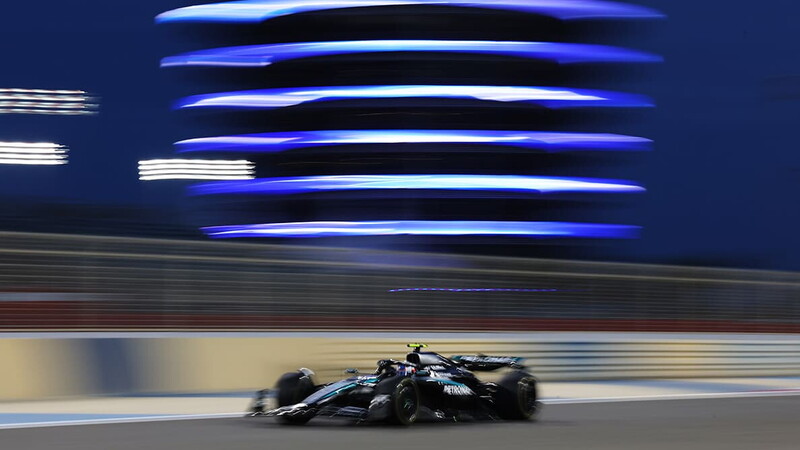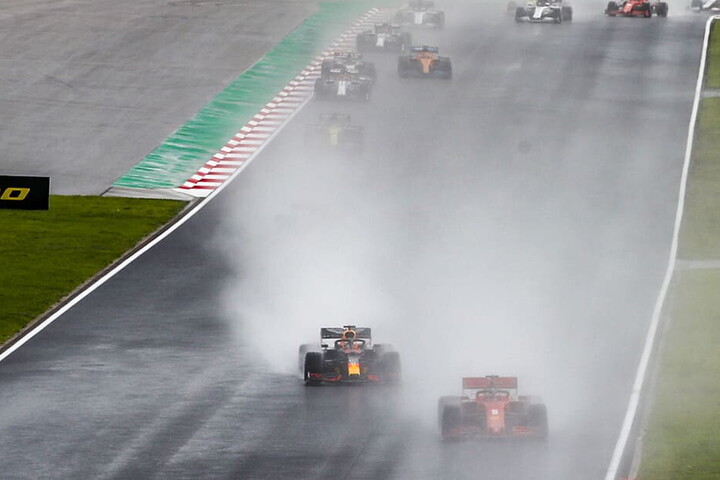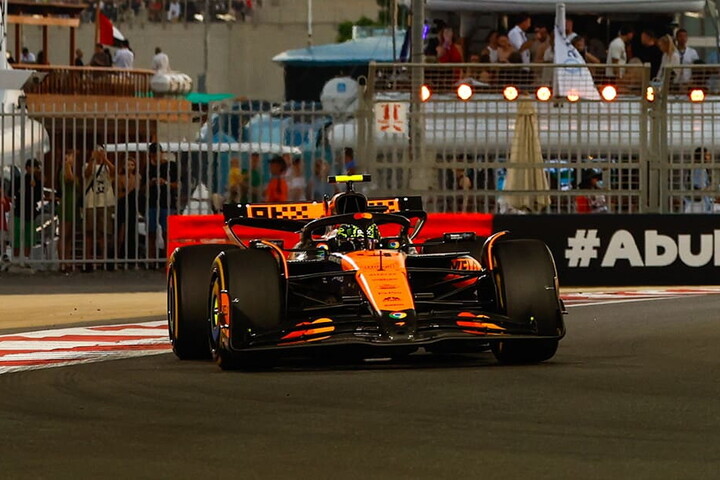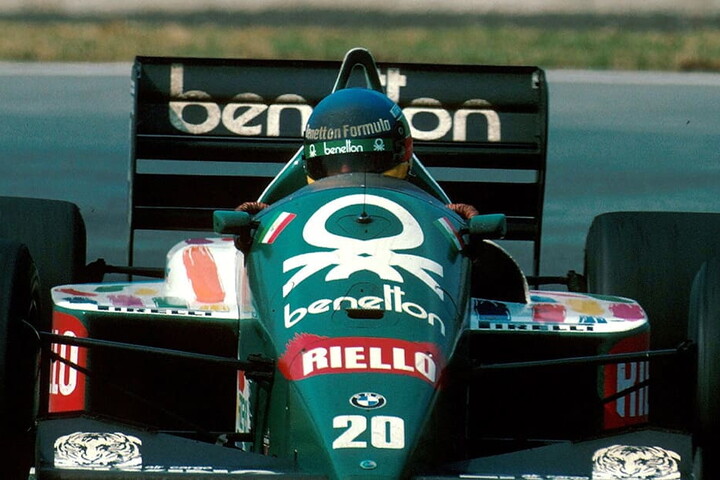There is one person from the world of Formula 1 for whom the Grand Prix at Imola is well and truly a home race. He was born in this town on May 11th, sixty years ago and it was here that his love of racing blossomed. Stefano Domenicali, Formula 1's President and CEO, first visited the paddock situated alongside the Santerno river when he was a little boy, drawn there by the deafening roar from the engines. Race after race, year after year, he rose to become the head of this thrilling and complex sport, one like no other in the world. Domenicali is one of the subjects of the first 2025 edition of Pirelli World, the magazine dedicated to all things Pirelli and today, we publish the full text of this exclusive interview.
“Freedom is not being up a tree,
it's not even having an opinion,
freedom is not a free space,
freedom is participation”
Giorgio Gaber, La libertà, 1972
The words of Giorgio Gaber in one of his best-known songs. One of Italy's most influential 20th-century singer-songwriters, Gaber, wanted to convey the message that being free doesn't mean escaping reality, or being able to say or do whatever you want, but rather being able to make the world a better place.
In a way, this reflects what's happened to Formula One over the past eight years since Liberty Media – whose name could not be more appropriate – took ownership of the most important, exciting and popular motor-racing championship in the world.
Since 2017, everyone involved – drivers, teams, sponsors and even fans – has been able to influence the development of Formula One, turning its ethos on its head and helping it to grow. Today, a Grand Prix is no longer an elitist event, that puts up barriers, both metaphorical and physical, in the belief that by distancing itself from the general public it will make itself more attractive or deserving of fans paying vast sums to get close to it.
Originally under the guidance of Chase Carey, Liberty Media began to unpick a system that had turned Formula One into a global sport by the end of the last century, but one that was ill-equipped to adapt to the challenge of the new millennium and its digital age. What was needed was a taste of freedom. That made itself felt, especially in the first three years of this new era, with teams and drivers finally being able to produce content for their social channels. Working with the sport's commercial rights holder, it benefitted from what became known as the ‘Netflix Effect', with the arrival of its Drive to Survive series. This enabled a whole new audience, primarily in the US, to peek behind the scenes of a sport that many had possibly never even heard of. It turned Formula One into a global phenomenon.
The main players – the drivers and teams – realised that Liberty Media had decided to take the sport down a new route and were determined to work with everyone involved to see it grow. Of course, Liberty Media is not a philanthropic organisation – any business must be sustainable and profitable – but those who feared this investment would be a smash-and-grab raid have been proven wrong.
The philosophy of shared objectives among all stakeholders has continued since Stefano Domenicali took the reins from Carey in 2021. Unlike the American manager, Domenicali has first-hand experience of the previous era, having spent 22 years at Scuderia Ferrari, rising to the role of team principal. Always open to challenges, the Italian also spent time working with Audi and then as president and CEO of Lamborghini, before he got the call from Liberty Media and returned to his first love, Formula One. He picks up the story here…

Does greater freedom mean a better Formula One?
“Gaber's words are perfect for us. We're implementing liberty and participation: participation of all the stakeholders, but above all, of the general public who follow the sport. We're listening to the fans and trying to make the Grand Prix experience – whether in person at the race-track or watching on a screen – more accessible, open and user-friendly.”
What does this mean in reality?
“I firmly believe that a Grand Prix today is much more than just a motor race for the city and country that host it. It's a special event and a unique platform that attracts global attention. That's why there's more and more cross-pollination between different worlds. Take music, for example. It's not just about the concerts that take place around the event, but the soundtrack that accompanies the show on the race-track. Or look at other sports, such as the NBA, with which we've organised [brand] activations. Then there's the medium of film and in particular the movie we're producing – starring Brad Pitt – in conjunction with Apple, Warner, Pirelli and many other partners. [Due for release in June 2025], it's taken its inspiration from Formula One and immersed itself in it, with several scenes being shot at Grands Prix. Everyone sees us as an ideal platform to promote their events and stars, and vice versa. In the past, none of this would have been possible. That said, we are fully aware of how important it is not to rest on our laurels. If there's one life lesson that a sport like Formula One teaches us every single day, it's that you must always keep pushing, always striving, not only to be faster but also more creative and more innovative. Teams and drivers do so to stay ahead of the competition, and we do so to attract an ever-wider audience and deliver the kind of return that underpins our partners' investment.”

How important is it for a sport that began and evolved in Europe – a continent where heritage is so strong – to now have its reins in the hands of an American company?
“It's very important, because the sports culture in the US is very different to ours. It's more open to crossing boundaries and freer from the shackles of tradition that so often prevent a sport from fulfilling its true potential. That not only applies only to Formula One, but to many other sports disciplines that have plenty of potential for growth but are so often blocked by the interests of individuals who don't have a greater overall vision. Fortunately, today's 10 Formula One teams [11 from next year with the arrival of Cadillac] realised pretty quickly that the time had come to overturn certain constraints; to give up a few things now in order to achieve a greater return in the future. They're now beginning to reap the rewards of that policy. This isn't happening in football, for example, and I can see how the Americans are struggling to introduce a new culture into a world that still thinks in traditional ways.”

And yet, in some ways, teams today have far less freedom than they did 20 years ago. Technical and sporting regulations are more restrictive. There's a budget cap, a limit to the number of power units and gearboxes a driver can use in a season, to name just a few. Does that mean there was too much freedom before?
In one sense that's true: too much freedom was inevitably leading to an increase in inequality and an escalation of costs, which in the long term would have become unsustainable, even for the richest teams that had the backing of major motor manufacturers. There was an unfair elitism – with those who defended the right to spend and expand as much as they liked in order to win. It's something I experienced first-hand for a large part of my working life, and it's no longer acceptable. I'm particularly happy that, in fact, it was the bigger teams that were prepared to give up some of their power, specifically financial. It meant the whole sport could weather the storm during the two years of the Covid-19 pandemic, and could then consolidate and grow into financially sustainable organisations. There's still work to be done in this area, but we're going in the right direction.”

In recent years we've seen sports personalities communicate much more directly – either through social media or with public gestures of dissent. Examples include American football star Colin Kaepernick taking the knee as a protest during the national anthem, which was then copied by several Formula One drivers. And there are others who choose to dress a certain way. How can this strong desire for individual freedom be reconciled with the demands of an inevitably complex organisation, where the interests of all those involved in the sport – teams, sponsors, media – must be considered?
“It's a very difficult balance and the intelligence of the individual must come into play. I'm pleased when drivers make themselves heard – and not just on matters that directly concern them. They too must understand where Formula One is going, what its objectives are and how we want to achieve them. Because we must never forget that, ultimately, we're all judged on our results. We're judged by the fans and in the long run you can't fool them. So, it's great for drivers to talk about themselves through their social channels, but they shouldn't consider this to be the only acceptable form of communication. It's all too easy to communicate when things are going well and all you're getting is praise. The difficulty comes when the wind changes direction. You can't then just close the door on the outside world. That's when you need the media to be part of the communication, maintaining the balance that I mentioned earlier.”

2025 is a special year for Formula 1. Tell us why.
“We're celebrating 75 years of the sport and wanted to do something special to begin this historic season. For the first time, we managed to arrange a true inaugural event for the Championship with the involvement of all 10 teams and 20 official drivers. The event – held in February at London's O2 Arena – was something unique for our sport; somewhat comparable to the opening ceremony of the Olympic Games. It was a further demonstration that the protagonists of this sport today are more willing to work together to make Formula One more popular and likely to attract a young and diverse audience – while never forgetting its roots. This is also true for our partners. We're pleased Pirelli chose the London event to preview the logo designed for its 500th Grand Prix in Formula One – an extraordinary achievement that will take place at Zandvoort on 31 August – and be celebrated at Monza the following week. The Italian brand is the longest-serving tyre supplier in the history of the sport”.

In recent years, it's fair to say we've seen greater restrictions of freedom in terms of speech and behaviour, sometimes severe. These include restrictions imposed due to political correctness and the physical restrictions brought in to contain the Covid-19 pandemic. Do you ever get nostalgic for that sense of absolute freedom that existed in the 1970s and 1980s?
“Honestly, no. I really believe there's no such thing as total freedom. I don't deny it's a fascinating ideal, but one has to deal with reality. Everything starts with respect. My personal freedom cannot be limitless because then it impinges on the freedom of others. That's where the concept of the common good comes in. For a community to work and thrive, everyone within it must give up a little bit of their personal freedom and, in a way, that's what we're doing in our sport, even if the comparison might sound irreverent. The Covid-19 situation is a perfect example. Despite the restrictions that everyone was subjected to as citizens of their respective countries, our sport reacted fantastically well to put on a Championship in 2020. It required significant sacrifice from everyone involved. In the case of the teams, those sacrifices were financial and technical, such as the decision to delay the introduction of new regulations and to freeze car development, which was a very heavy price to pay for some. Then there were the hundreds of people who worked at the Grands Prix, who were also personally under a lot of stress, all of this to ensure that Formula One did not stop working and still managed to put on a show.”

Do you feel free yourself?
“Absolutely. I was lucky enough to grow up in a family where freedom was an important value and I've tried to pass that on to my own family now; to my wife Silvia and especially to my children. But again, that's not the freedom to do exactly as they please, but instead to choose the right path, to feel free to test themselves and to make mistakes. Of course, I'm free to give them advice, to ensure they're in the best position to make their choices, but now my children are becoming adults – Martino is 21 years old, Viola is 19 – and they have to take responsibility for their actions.”





